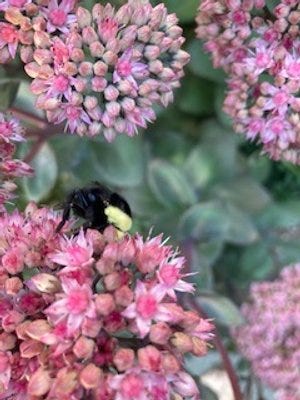Bees: Mothers, Emily Dickinson, and The Secret Life of Bees by Sue Monk Kidd
My fuller interest in bees began years ago when my granddaughter, at about age eight, received two lessons in bees from her mother. As I watched my daughter, the buzzing bee, my granddaughter, and the flowering bush all in synchrony, there was a lesson for me too. For my granddaughter, the moments were her opportunity for curiosity within the safety of her mother's calm words of awareness when approaching the bee... go closer—without fear. I witnessed the lessons that my granddaughter could take into her future. In a moment of clarity, I thought of my mother sometimes teaching me, in certain situations, with a tone in her voice and a look on her face that projected fear. I left the bush that day, not only with a new relationship with bees, but also with a new feeling of comfort as I realized my daughter had momentarily been my mother.
My daughter, granddaughter, and I knew the importance of bees.* So have others known. I imagine Emily Dickinson writing for us, among her many readers, in her poem about a bee—although I point out... her letter is written by Fly.
Bee! I'm expecting you!
Bee! I'm expecting you!
Was saying Yesterday...
That you were due –
You'll get my Letter...
Or better, be with me –
Yours, Fly.*
Sue Monk Kidd wrote for us too. The Secret Life of Bees * begins in the world of fourteen-year-old Lily Melissa Owen.
At night I would lie in bed and watch the show, how
bees squeezed through the cracks of my bedroom wall
and flew circles around the room . . . not even looking
for a flower, just flying for the feel of the wind,
split my heart down its seam. . . .*
Looking back, Lily will see that it was the bees that night that caused her life to begin "spinning off in a whole new orbit"* and her conclusion was that the bees had been sent. Lily is white. Her daddy, "T. Ray because 'Daddy' never fit him,"* is a parent lacking care and responsibility. Lily grows up believing that at age four she accidentally killed her mother, a story that T. Ray doesn't confirm or deny. To solve the issue of her upbringing, T. Ray takes Rosaleen, a childless worker from his peach orchard, who is "so black that night seemed to seep from her skin,"* to be Lily's stand-in mother. When she is twelve, Lily finds a stapled paper bag in the attic with a few items of her mother Deborah's. In particular, a small wooden picture of Mary, the mother of Jesus, with the words Tiburon, S.C. written on the back, convinces Lily that this is a sign.
Lily and Rosaleen soon run away heading for Tiburon, S.C. where Lily hopes to find her past with her mother. When they arrive at the home of August Boatwright, a woman who "keeps bees all over the county"* and makes Black Madonna Honey, the two runaways find both a welcome and safety. They become part of the beekeeping business. In an unexpected and heated visit from T. Ray, seeking to bring Lily home, she defies him and finally learns the truth of what happened to her mother. With that, Lily's quest for her mother's love and forgiveness ends for she can now imagine having both. As T. Ray drives away, Lily looks back at the porch where the group of women who have loved her have gathered, and are now watching, and says, "All these mothers. I have more mothers than any eight girls off the street."*
I too have had more mothers; they are also my daughters. At times, I have listened to them mothering their children and learned how mothering is meant to support, encourage, protect, and inspire, and in those moments, I have recognized how I have been mothered by my daughters too.
My realization is, "Mothering is kind and protective caring and may be experienced in other relationships than that of our own mother."*
* About bees: “As far as important species go, they [bees] are top of the list. They are critical pollinators: they pollinate 70 of the around 100 crop species that feed 90% of the world.” https://www.bbc.com/future/article/20140502-what-if-bees-went-extinct
* Emily Dickinson, “Bee! I’m expecting you!” in Carl Sandburg, From Daybreak to Good Night: Poems for Children (Toronto: Annick Press, 2001), 15.
* Sue Monk Kidd, The Secret Life of Bees (Great Britain: Headline Book Publishing, 2002), 1.
* Ibid., 1.
* Ibid., 2.
* Ibid., 58.
* Ibid., 274.

